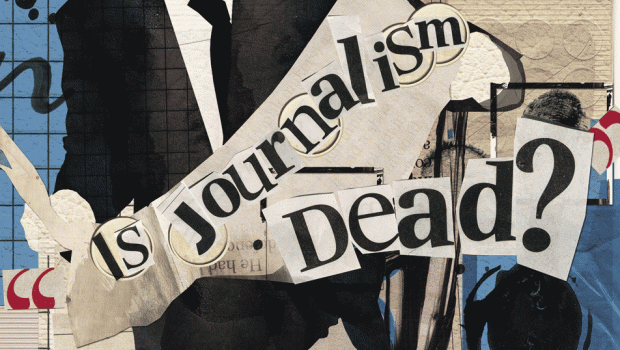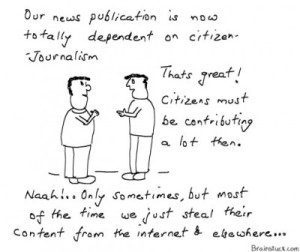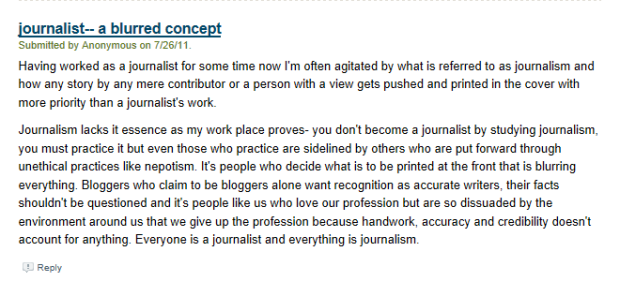Posts Tagged democracy
Can anybody be a journalist?
Posted by romainbardet in Uncategorized on November 27, 2012
Who can be called a journalist? The answer isn’t so easy, but so important in a world where everything goes so fast and information has a great impact on human activities.
Today, almost anybody in the world has a smartphone and an access to the web. Anybody can post a picture, a text or a video and give a sort of information to the world. How? With the new media: Blogs, Facebook, Twitter, Wikipedia or YouTube. Information is so easy and so quickly widespread trough the planet. “Great evolution”, will say the ones. “Disinformation” will respond the others.

Will the professional journalists disappear?
Picture: macalester.edu
The raise of citizen journalism: the new world’s voice
People don’t want to stay silent. For many centuries, journalists have been people’s voices. They found, collected and verified the information and always searched for the truth. But with the Internet’s democratization, people don’t want to wait that the journalists let them speak. They prefer to raise their voice directly and explain or show something to the whole world.
With the advent of Internet 2.0, new media technologies, for example social networking and media-sharing websites, gave citizens the opportunity to give information. Those citizen journalists often report breaking news faster than “normal” journalists. We can cite the events of Arab Spring, which were a lot report by anonymous citizens in the heart of the revolution. Another example of this quick report and exchange of information is the “Occupy Wall Street” movement which debuted on September 17th 2011.

Syrian activists send information with their computer.
Picture: bbc.co.uk
A really actual example is Syrian crisis. The country is closed and inhospitable for the journalists. But Syrian people who live the war post videos and testimonies on YouTube, social media or blogs. They claim their story and give a reality that many journalists just can’t report. It benefits to the citizens in the world, to realize what’s happening there!
Chris Shaw, the editorial director of ITN, a Britannic production society, said to The Guardian that social networks were opening up “whole new vistas for documentary filmmakers. You can make the most amazing films using content from social networks, sometimes with the permission and sometimes without the permission of the people who shot them.”
This reality takes all its sense with the Syrian crisis. “There are places like Syria where journalists haven’t been able to go and […] there is an extraordinary resource on social networks for current affairs, even though we have to take extraordinary caution to verify what we use”, said Chris Shaw.
Let’s see a short funny video, but with interesting points of reflection. “No no, I’m the journalist!”:
Let people participate
What we can observe today, is that many classical media websites give people the possibility to react and deepen the information. You can let comments in the website’s blog for example. Professional journalists are not alone anymore, because readers give a feedback and let them know what they think about the article and more globally about the topic.
Other media are based on the concept that citizens can contribute to the news by giving information or sharing links, but with the control and the work of professional journalists behind. This is the case of Digital Journal or Rue89 in France for example. But is it citizen journalism? I don’t think so. We can call this hybrid journalism, because citizens and professional journalists work together.
 But some websites or blogs are entirely “citizen made”. You, I, anybody can add an article and participate to information’s transmission. But these platforms ask the contributors to share valuable and verified information, and grant themselves the right to remove an inappropriate content. For example, we can mention the Quebec’s website centpapiers or the better known Wikinews.
But some websites or blogs are entirely “citizen made”. You, I, anybody can add an article and participate to information’s transmission. But these platforms ask the contributors to share valuable and verified information, and grant themselves the right to remove an inappropriate content. For example, we can mention the Quebec’s website centpapiers or the better known Wikinews.
American information’s channel CNN launched in 2008 its new participative site: CNN iReport. This website is only based on citizens content. They can post a story, picture, commentary or video and create the news. What is interesting with this concept is that CNN’s journalists sometimes select a subject and diffuse it on the classic channels. With this system, citizens can really be a part of the media agenda setting.
Citizens, yes! Citizen journalists, no!
So where is the difference between a citizen and a professional journalist? Well, let’s go back to the very base of journalism: giving information. Information isn’t just a concept; it’s the reality, the truth, what’s really happening. Yes, journalism is “making information” and transmitting this information to the people; a full-time job!
Here are some answer people gave to the question “Who should be called a journalist?” on ijnet (international journalist’s network):



If we set aside the fact that professional journalists work for a media and are paid for this, we must consider that journalists respond to some exigencies and rules. They have to verify the sources, analyze them, explain the events, replace them in their context and be as objective as possible. And the journalists must respect deontological rules. Do the citizen journalists respect those exigencies? Because they must, instead we just can’t call them journalists.
Another point is that a professional journalist isn’t in the commentary when he writes an article. When a citizen journalist writes, we often observe committed comments. Professional journalist informs, when online citizen testifies to what he sees, ears or notices.
But today, citizens contribution is a wealth for journalists. An inexhaustible source of ideas and materials than can be used. And it forces journalists to do their job: treat information and not only transmit it as it is. Citizens make their citizen’s job, when they transmit something important and newsworthy to the journalists.
You’re a citizen, a journalist, or maybe a citizen journalist: what do you think? Leave you comments!
How journalists use social media: Between marketing and democratic purpose
Posted by Stefcasar in Technology on December 18, 2011
Before web 2.0, journalists had the monopole of the information. The public needed their micro or camera to exist in the public sphere. Nowadays, people don’t need media anymore because social media are building a free public sphere in which everybody is able to diffuse information and express opinion freely. Social medias became major competitor for traditional media because they undertaking their role. In addition to that traditional media has to face mistruth crises. They are often accused to be too close from the economic interest and too far from the public interest.
To face these serious challenges media had two choices. The first one was to consider social media and citizen journalist as enemies. The second one was to consider social media as a tool and citizen journalist as an ally. Most of the media had considered the second solution as the more appropriate.
There is an increasing use of the social Medias by journalist
Journalist use social media to:
- Find information and new stories.
- Improve their management content by publishing information in social media. The use of podcasting or linking appears to be a relevant marketing tool.
- To interact with the audience and get feedback about their work.
- Feed-back and public opinion are used to adapt the media content to the public demand.
1. Find information
According to a study realised by Oriella PR Networkbetween March and April 2011, social Media are considered more and more like a relevant tools by journalist to collect informationand find new subject of interest.
This study is realised in 15 countries across North and South America and Europe and repeated every year since 2008.
It shows that almost 50% of the 500 interviewed journalists are using twitter to sourcing story and 35% of them are using Facebook for the same purpose. 30% of them are gathering stories from blog post they know and 40% with blogger they do not know.
According to a study made by the Arketi agency, there is an increased use of social media by traditional media. However, the reference to official channel is still the major method to search for information. Journalists are mostly referring to PR agency, public relations contacts and industry sources.
The numbers found by both study are quite similar when it’s concern social media use. However there is some differences when it comes to the numbers concerning the use of traditional source. But the point is that both studies show that traditional sources remain the most use information source. Despite the increasing use of social media by journalist.
Source: http://www.arketi.com
The use of Facebook’s profile to get information
Using Facebook profiles to get pictures and some information about people that are accused of crime become a wide spread practice in the journalist field. Facebook profiles allow journalist to find information about the personality of the accused person. If the profile is public there is much more information available.
An article published by BBC uk about the double attact commited by the sadly famous Andres Breivik in Norway is a good example to illustrate this way of collecting information.
Those pictures coming from Andres Breivik’s Facebook profile were used by a large amount of medias all around the word.
This extract of a BBC.uk article shows how personal information published on Facebook account can be useful to draw the Andres Breivik’s personality profile.
Facebook and private life protection
This kind of journalistic practice revel questions about privacy and image rights. Swiss’ legislationstats that image right is an absolute right. It means that no one has the right to publish a picture without the contentment of the pictured person. This law contains however an exception. If there is a public interest the picture can be published. This law is ambiguous because it’s difficult to draw the border of the public interest.
Twitter use to find information
Twitter is a good tool for journalists to get information rapidly. During relevant trial, political election or parliamentary reunions, a large amount of tweets are twitted. Journalist can sat behind their computer and following what’s happening minutes by minutes. Another advantage is that journalists can following many twitter account at the same time. So they can have access to divergent perceptions of the event.
Example of the election to the federal council 2011: The 14 of December RSR info posted almost 300 tweets about the election
2. Publish information
Facebook and twitter appear to be interesting management content tools. They can draw more traffic and permit to touch a wider audience. All the Swiss Radio and television (RST) shows have a twitter account and some of them have a twitter account. Those accounts are mostly used to post teasing for the next broadcast. Journalist also posts link and podcast to able the public to listen, watch or read what he has missed.
To be “friends” with the audiance is a useful marketing tool for journalist. They are more likely to touch the audience because nowadays people are more on Facebook than behind the TV or the radio post.
Journalists can also use Facebook account to appeal witnesses for contribution to forum or interview.
The example of the shows On en parle of the RSR which use a Facebook account to optimised it content and ask for public contribution.
3. Get Feedback and interact with the audience
The RTS stats that one of the objective of shows’ Facebook account is to allows the public to interact and have a dialogue with journalist.
On the whole, there is little interaction between journalists and public. Journalists rarely participate to debate. Some of them never answer to the public, other answer only at the practical request such as: “when journalist XY will come back in the show?” or “I don’t receive the newsletter anymore”. Most of them answer to critics and bad feed-back.
There is some journalist like Darius Rochebin that act friendly with the audience. He answers sometime to comment, tell jokes and even put pictures of his little daughter.
4. Adapt content to the demand
Facebook accounts are useful to get feedback. Those feedbacks helps journalist to adapt their content to the public audience.
They can use critics to correct the mistake in their content.
They can know witch kind of subject the audience :
 or
or
They can make survey to get public opinion or advice.
All those information help them to be closer from the public demand and answer to it in a proper way.







